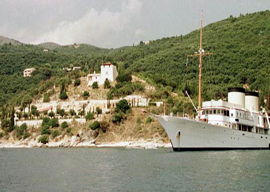
March 22, 2013

Corfu
He was a member of a charmed circle of Hellene and Philhellene intellectuals just before and after World War II, experiencing modern Greece and seeing it as a place rich in beauty and a stimulus to artistic creation. Patrick Leigh Fermor, whose biography by Artemis Cooper I just put away almost in tears—like a magical night with a girl of one’s dreams, I didn’t want it to end, but end it did—was a second Byron in Greek eyes. I found the book unputdownable, as they say in Boise, Idaho, especially the rich descriptions of rambunctious jaunts in tavernas and places where I had spent my youth.
There is always a feeling of imminent loss where Greece is concerned, an anxiety of what is in store, and no one captured it better than the Nobel Prize winner George Seferis—a close friend of Patrick Leigh Fermor’s—when he wrote:
And yet we knew that by the following dawn
nothing would be left to us, neither the woman drinking sleep at our side
nor the memory that we were once men.
This mood of apprehension, foreboding, and fear of oblivion is very, very Greek. Every invented paradise soon turns into hell, starting with Homer, Aeschylus, Sophocles, and Euripides. After all, we Greeks invented the “T” word.
The second Greek poet to win the Nobel Prize was Odysseus Elytis, ten years or so after George Seferis. Elytis’s brother was the non-playing captain of the Greek Davis Cup team, and he and I didn’t exactly get along. His name was Alepoudelis—“little fox” in Greek, Elytis being a pseudonym, and he was always trying to buy a used car from me for peanuts. I loathed that petty little man who had not named me in the singles against Spain back in 1964 because I had gone out all night with a queer bullfighter and his entourage. (I was hoping to meet Ava Gardner, a friend of the gay caballero.) Yet when I asked the little fox for an intro to the Nobel Prize winner for literature, he uncharacteristically gave me a glowing one. I met Elytis in Kolonaki, the chic residential section of Athens where we both lived.
At Café Byzantium, the first question I posed was the usual boring and unimaginative question that hacks ask of those whose work they know little about: “What does winning the Nobel mean to you?”
“I’m getting more pussy,” came his answer. I thought it so great I grabbed his hand and kissed it. (The one-sentence interview appeared in a Greek newspaper with glowing letters to the editor following.) We then proceeded to drink ouzo and chat up the girls.
But back to Paddy and his circle of friends. The leading players were the painter Niko Ghika, George Seferis (the “Colossus of Maroussi,” as Henry Miller immortalized him), George Katsimbalis, and our hero Paddy. I only met Ghika and Paddy once—in 1978 or ’79—under unfortunate circumstances. Ghika is Jacob Rothschild’s father-in-law, and his paintings throughout his life have been fresh and clean and pure and naked of all pretense. I was lying at anchor in Corfu on Gianni Agnelli’s boat when my host asked me to go up at the Rothschild villa and ask them down to lunch. Back then it was the only way to communicate, unless the Rothschilds understood Morse code.